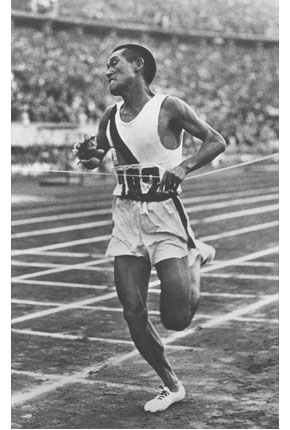
Berlin, 9 August 1936, Games of the XI Olympiad: Kee-Chung SOHN, competing at that time for Japan under the name Kitei SON, gold medallist, at the finish line of the marathon in the Olympic stadium. Credit: IOC Olympic Museum CollectionsOther names: SOHN, Kee-Chung
Born: 29 August 1912
Deceased: 15 November 2002
Birthplace: Sinuiju, (now Democratic People's Republic of Korea / North Korea)
Nationality: Korea / South Korea
Sport: Athletics
ATTENDANCE AT THE OLYMPIC GAMES
Berlin 1936
AWARDS
Olympic medals:
Gold: 1
On 3 November 1935, Sohn Kee-chung of Korea (South Korea) set a world marathon record of 2:26:42.0. Because Korea was, at the time, occupied by Japanese forces, Sohn's hopes for competing in the 1936 Olympics depended on his ability to qualify for the Japanese team. This he accomplished, as did fellow Korean Nam Seung-yong. Both young men were forced to endure the further insult of adopting Japanese names (his participation is recorded under the Japanese name Son Kitei). Sohn, a fervent nationalist, always signed his Korean name in Berlin, and whenever he was asked where he was from, he made it a point to explain that Korea was a separate nation. Defending marathon champion Juan Carlos Zabala of Argentina took the early lead, followed by Sohn and Ernie Harper of Great Britain, who ran together. After 28km, Sohn and Harper passed Zabala. Sohn soon pulled away and won by more than two minutes. Nam finished third behind Harper. At the medal ceremony Sohn was forced to endure the humiliation of having his victory celebrated by the raising of the Japanese flag and by the playing of the Japanese national anthem. Both Sohn and Nam registered a silent protest by bowing their heads. As for the race itself, Sohn explained, "The human body can do so much. Then the heart and spirit must take over." Back in Korea, Sohn was a national hero. One newspaper, Dong-a-Ilbo, published a wire-service photograph of Sohn on the victory platform - but with one alteration: they painted over the Japanese flag on his sweatshirt. The Japanese colonial government responded by jailing eight people connected with the paper and suspending its publication for nine months. In 1948 Sohn was given the honor of carrying the South Korean flag in the Opening Ceremony of the London Olympics, the first to be attended by an independent Korea. Forty years later, in a moment that brought tears to an entire nation, Sohn Kee-chung entered the Seoul Olympic Stadium bearing the Olympic torch. The 76-year-old Sohn bounded around the track, leaping for joy and bursting with pride for himself and for his country.